Tim Hannigan was born in Penzance in the far west of the UK, and grew up on the stormy shores of the Atlantic. After leaving school, he worked as a chef to fund his travels, before studying journalism at the University of Gloucester. He then headed to Indonesia to teach English. He stayed on in the country for several years as a journalist and travel writer. His first book, Murder in the Hindu Kush, was published in 2011, and was shortlisted for the Boardman-Tasker Prize for Mountain Literature. Subsequent books include the award-winning Raffles and the British Invasion of Java, and A Brief History of Indonesia. His latest book is A Geek in Indonesia. He’s currently working on a PhD at the University of Leicester, investigating the ethical issues of contemporary travel literature.
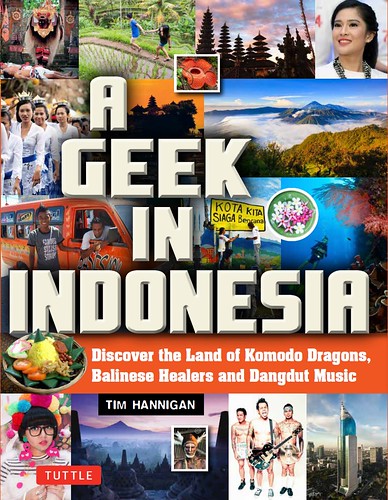
What motivated your decision to teach abroad? How/why did you choose where to go?
I’d always been curious about the possibility of some kind of teaching career, and in my mid-twenties, an overseas English-teaching job seemed like the best way to test the waters, without committing to a full post-grad college course to teach school in the UK. That was my starting point. I was lucky enough to sign up for a particularly good – and particularly intense – five-week Cert.TESOL course, which I found genuinely inspirational. It remains the most satisfying educational experience I’ve ever had – the thrill of being able to say quite clearly at the end of every single day that I knew a whole bunch more than I had that morning was not something I’d experienced at school or college!
Once I’d done my training, there was really only one place to go, and that was Indonesia. I’d already made three long backpacking trips there, and the chance to live there for an extended period was a major motivation when it came to training to teach.
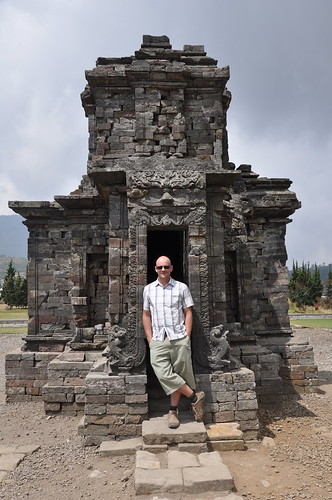
How did you find your job? What resources did you use?
I knew I wanted to teach in Indonesia, but I knew I didn’t want to be based in Jakarta or Bali. Beyond that, I was open to any possibility. As it happened, one of the staff at the school in the UK where I did my Cert.TESOL training had recently returned from several years teaching in Indonesia, in Surabaya. I asked him about it, about life in that city, and about the school where he’d taught (one of the big franchises), and he was pretty positive about the whole experience. I saw that they were advertising on one of the TEFL websites, so I got in touch, did a telephone interview, and before I knew it I was on my way. It was a great choice, as it turns out – though I was annoyed to discover just after I arrived that there was another local chain, operating in the same market and with loads of job openings, but paying about 25 percent more and offering longer holidays! Do your research, folks!

What was your experience like? Can you share some favorite memories – and challenges?
The whole thing was a brilliant experience on so many levels. I made great friends, learnt a lot about teaching, got properly to know a country I was already passionately interested in, and set myself up for a career – in writing, not teaching, as it happens, but it could have gone either way.
Favorite teaching memories are mainly around the few extra-special classes I had – particularly one bunch of senior high school students, and one unruly mob of sixth graders. The first lot were super-smart, with very high-level English, and always a pleasure to talk to; the second lot were a bit of a handful, but they never failed to make me laugh. Challenges were mainly practical ones around teaching students whose culture and mainstream school experience didn’t really encourage the kind of relaxed approach to language learning I was trying to encourage, but I developed some ways around that.
Outside of school, there are literally thousands of special memories, but one moment always sticks with me. It was Sunday night, heading back from a weekend in Bali with a friend. We’d been with some other teachers who flown back to Surabaya, but we’d decided to save money and take the night bus instead. We’d be back in plenty of time for work next day. It was a rickety old bus, rolling through the velvety tropical darkness towards East Java. I was sitting near the open door with a warm wind, scented with strange things, blowing in from outside. I must have been about two months into the job at the time, and suddenly a thrilling realization hit me: I live here…
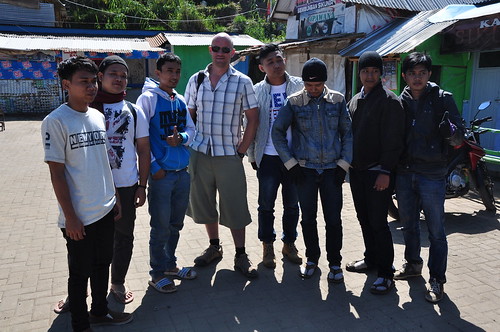
What skills did you develop from your experience? Do you feel changed from your teaching experience abroad?
Because it’s so solidly based in definable methods, English teaching (if you do a good training course first) is an absolutely fantastic way to get equipped with transferable teaching skills (I actually started – but then abandoned – a postgrad course for teaching elementary school a few years later, and it was nowhere near as densely packed with instantly applicable and solidly explained practical teaching skills as my Cert.TESOL). I’ve since gone on to do loads of public speaking, run plenty of writing workshops, done some lecturing, and worked as a tour guide, and in all of those things I catch myself deploying nifty little tricks of the trade that I would never have known if it wasn’t for teaching abroad.
As for the bigger picture, there’s no way in the world that time living abroad – especially being “close to ground level”, which teaching allows, unlike many more rarefied expat roles – couldn’t leave you changed. I’ve lots of old friends and colleagues from the Indonesian teaching circuit on Facebook, and though many of them are now settled in other lives and other careers, some little thing online – a post about a particular place or remembered experience – often sets them all off in an eruption of emotional nostalgia. It’s in your skin forever, like a tattoo.
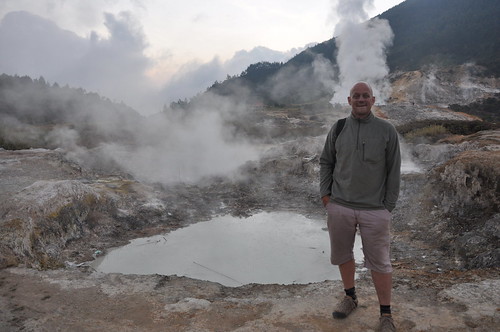
Has your experience helped you get to where you are today?
Without a shadow of a doubt. My mum was a schoolteacher and my dad a writer and journalist, and I always had an inclination to follow one or other of them in my own career. My year teaching in Indonesia opened up both possibilities. It gave me a great introduction to teaching, but also, while I was working I started writing seriously – travel articles for the regional English-language press at the beginning, which, in the space of the year, gave me the launch-pad I needed for a proper freelance writing career. Although it’s writing that eventually came out tops, there’s still a bit of a tug the other way, and I wouldn’t be surprised if I don’t eventually go back to some kind of teaching, probably at college level. And of course, my time teaching gave me the proper entry into my enduring focus as a professional writer: Indonesia.

Any advice for teachers thinking about working overseas? What are some highlights or things that you gained or changed your perspective?
The first and most important thing to say – and I can’t stress this enough – is that if you’re going specifically to teach English as a foreign language, do a good training course first. You often meet people who want to teach, and who see getting a certificate as some kind of annoying formality. But I cannot overstate how well I was set up by my Cert.TESOL course. I knew a few teachers who had either managed to get a job without proper training, or who had slipped in with some dodgy certificate from a second-rate provider, and they were almost always the ones who enjoyed teaching the least. It’s not surprising when you think about it: it’s never much fun doing something you don’t really know how to do. In fact, even if you’re qualified to teach high school, elementary school, or college back home, and are thinking of teaching English as a foreign language, there’d still be a lot to gain from doing a training course specifically for that field. There’s a much closer emphasis on lesson structure and technique in language teaching, and having a grounding in the tricks of the trade will make the whole thing a hundred times more enjoyable.
As for the wider matter of working overseas, be prepared for some sort of “hump” to get over in the first couple of months. Plenty of folks turn up without quite knowing what they’ve let themselves in for, and bail out long before their contract is over. Do yourself a favor and stick it out for at least three months before you throw in the towel, no matter how bad you’re feeling. Your system is dealing with a complicated barrage – culture shock, new job, new social circle, and more besides. You might think you hate the place, and that the job is not for you in the early days, but focus on how privileged you are to be having this experience, know that in years to come you’ll be looking back on this as an overwhelmingly positive experience, and one day, just a couple of months in, you’ll be riding some rickety bus through a tropical night, and the thrilling realization that this place is now your home will hit you – and the fact that you’ve four classes to teach tomorrow will actually be cause for happiness!

How has international education impacted or influenced your cultural identity?
Massively – I speak another language because of the time living abroad that started with a year of teaching, and I have a close affinity with, and a sense of being at least partly an insider in, a country besides my own. Having multiple international affinities is something entirely normal in our modern, globalized world; it’s something that informs art and literature and culture in general. But the fact is that most people are still resolutely mono-cultural, no matter how open-minded and well-travelled they might be. Teaching abroad for a year or two is one of the easiest and best ways to overcome that, to make yourself into a global soul.
#TeachAbroadBecause ... it’s a way to become a global soul!
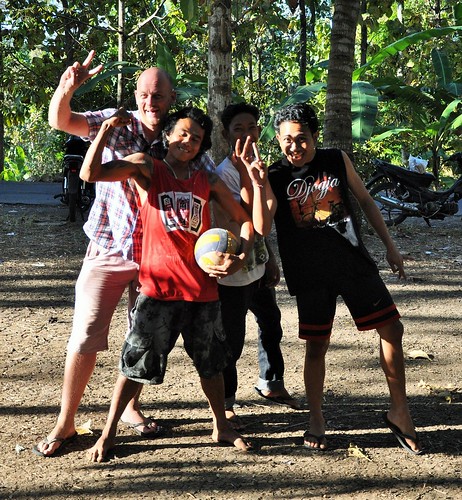
Find Tim online:
Twitter: https://twitter.com/Tim_Hannigan
Facebook: https://www.facebook.com/ABriefHistoryOfIndonesia/
Website: https://timhannigan.com/
All photos courtesy and copyright Tim Hannigan
